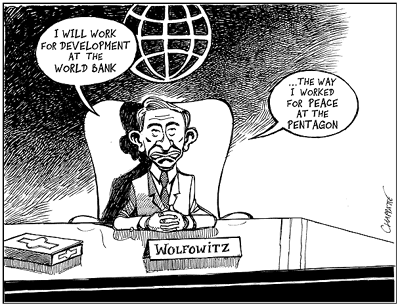
As creatures of the monetarist global economy, the bar will always be high for the former deputy defence secretary and the bank.
Both the man and the organisation have a long history of advancing a conservative, pro corporate agenda.
Wolfowitz has targeted graft as a major impediment to development and called for greater transparency in countries that receive aid.
"The best check against corruption is strengthening governance and regular monitoring, transparent information, rewarding success and penalizing failure," Wolfowitz said.
Wolfowitz ‘s anti-corruption plan includes training civil servants, judicial reform and freedom of information as well as a new system to curb the risk of corruption on World Bank projects.
A statement issued by more than 70 NGOs charges that Wolfowitz's campaign ignores the corruption that routinely impacts countries that are dependent on World Bank loans.
Since taking over last June, Wolfowitz has halted lending to Chad when that government made a grab for oil profits in violation of an agreement with the World Bank and also halted projects in India and Kenya over corruption concerns.
Naming and shaming big companies
"The new corruption drive is all well and fine but we have to deal with the supply side. Where the bank can really deliver is by naming and shaming big companies that pay bribes," said Max Lawson, policy advisor at Oxfam International.
Lawson pointed to the Republic of Congo, where Wolfowitz recently pushed for more transparency in the oil sector when the country applied for debt relief, which saw an oil trading scandal erupt after vulture funds that bought cheap debt hired private detectives to track down investors."This is the kind of investigating the World Bank should be doing, not vulture funds," he said, estimating Africa alone loses around $70-billion to tax havens and other shelters.
NGOs criticized the World Bank for ignoring fundamental causes of corruption and dragging its feet in responding to allegations of corruption in Bank-funded projects.
"The World Bank has financed many projects riddled with corruption such as the Enron power plant in Guatemala, the Chad-Cameroon oil pipeline and Shell in Nigeria," said Wenonah Hauter of Food & Water Watch, "Many of these corporations are engaged in highly questionable activities, financed by the World Bank, that involve influence payments, human rights abuses, and projects with damaging social and environmental impacts.
Reward corrupt behaviour?
Who holds the World Bank accountable for continuing to reward corrupt behaviour?"
Critics also responded to Wolfowitz's recent anti-corruption programs, pointing to the World Bank's corrupting influence in client countries.
"Corruption also occurs when democratic processes are bypassed to influence legislation for private gain - similar to Jack Abramoff's crimes in the U.S.," said Sameer Dossani of the 50 Years Is Enough Network.
"Economic policies for countries around the world are effectively written by the World Bank and the IMF, disrupting what should be a democratic process, and making governments accountable to foreign entities rather than their own people. Worse, most World Bank- and IMF-imposed policies benefit transnational corporations and local political elites."
Even putting the best spin on Wolfowitz's anti corruption campaign, doubts persist over his and the bank’s ability to overcome entrenched tendencies to protect the corporations. Corruption is not solely the preserve of functionaries and crooked or inept governments.
The fear is that the man and the organisation are blinkered by their past. The hope is that a real wolf has not been set to guard the sheep.

No comments:
Post a Comment